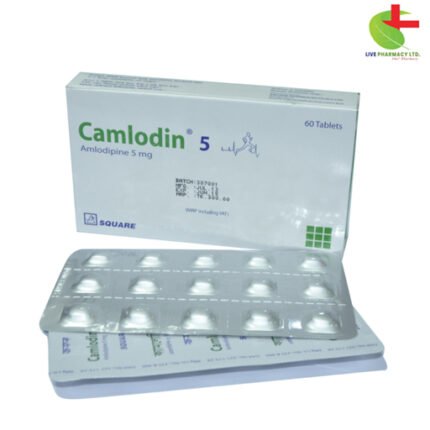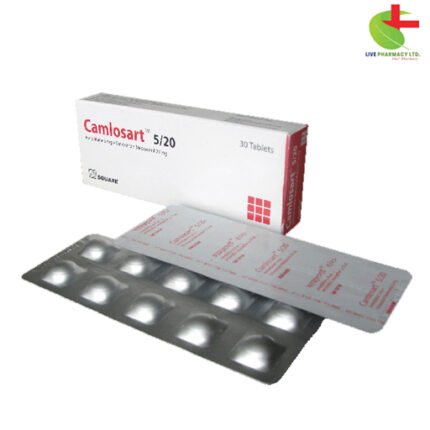Camlodin Plus 5/50
112.00৳ Strip
- Experience effective management of essential hypertension and angina pectoris.
- Benefit from a fixed-dose combination of Amlodipine and Atenolol.
- Reduce blood pressure through targeted action on vascular and cardiac mechanisms.
- Convenient once-daily dosing for streamlined cardiovascular health management.
- Well-tolerated profile ensures optimal treatment experience.
 Brand
Brand
|
Square Pharmaceuticals PLC |
|---|---|
 Generics
Generics
|
Amlodipine Besilate + Atenolol |
Indications
This medication is recommended for use in:
- Individuals diagnosed with essential hypertension.
- Patients with both angina pectoris and hypertension as concurrent conditions.
- Post-myocardial infarction (MI) patients.
- Patients experiencing refractory angina pectoris where nitrate therapy has been ineffective.
Pharmacology
This formulation comprises a fixed-dose combination of Amlodipine and Atenolol. Amlodipine, a dihydropyridine calcium antagonist, inhibits the influx of calcium ions into vascular and cardiac muscle, exerting a stronger effect on vascular smooth muscle. Amlodipine acts as a peripheral vasodilator, reducing peripheral vascular resistance and blood pressure by directly affecting vascular smooth muscle. It also decreases coronary vasoreactivity and cardiac demand by reducing afterload.
Atenolol, a cardioselective beta-blocker, reduces blood pressure by lowering cardiac output, plasma renin activity, and sympathetic outflow from the central nervous system (CNS). It also diminishes myocardial oxygen demand through negative inotropic and chronotropic effects.
Dosage & Administration
The recommended dosage is one tablet of Amlodipine and Atenolol (5/25 mg) once daily. If necessary, dosage may be increased to two tablets daily or adjusted as per physician’s advice, with individualization of dosage.
Interactions
Interactions may occur with drugs such as Disopyramide and Ampicillin, affecting their clearance or levels. Beta-blockers like Atenolol may impact insulin sensitivity and secretion when used concomitantly with oral antidiabetics or insulin.
Contraindications
This medication is contraindicated in individuals with hypersensitivity to either component, sinus bradycardia, second- or higher-degree heart block, cardiogenic shock, hypotension, congestive heart failure, or poor left ventricular function.
Side Effects
The combination of Amlodipine and Atenolol is generally well-tolerated. Common side effects include fatigue, headache, edema, nausea, drowsiness, anxiety, and depression.
Pregnancy & Lactation
Use during pregnancy should be considered only if benefits outweigh potential fetal risks. Breastfeeding is not recommended during treatment with this combination.
Precautions & Warnings
Caution is advised in patients with bronchospasm or renal impairment. Monitoring may be necessary in patients with severe hepatic impairment. Drug withdrawal should be gradual to avoid potential complications.
Overdose Effects
Though rare, overdose may lead to hypotension and, less frequently, congestive cardiac failure. Symptomatic treatment is recommended, including gastric lavage or activated charcoal administration if necessary.
Therapeutic Class
This medication belongs to the class of combined antihypertensive preparations.
Storage Conditions
Store below 30°C, away from light and moisture, and out of reach of children.













Reviews
There are no reviews yet.